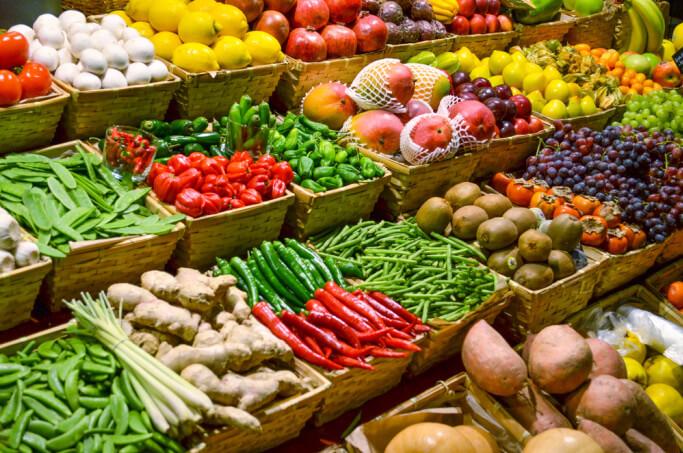13 Ways to Save Money on Groceries
With rapidly increasing food prices, it’s important to find ways to save money on groceries.
Every time I go to the grocery store, I can’t believe how much almost everything has increased in price.
Where we live, I’ve seen a dozen eggs for over $5.00! That’s about twice as much as they were last year.
From meat and bread to milk and flour, it seems like every month the cost of food keeps going up.
That’s why I’ve put together this list of 13 ways to help you cut your food bill by saving money on groceries!

How to Save Money on Groceries
It’s no secret that the cost of living has been skyrocketing with no end in sight.
If you’re like most families where finances are tight and you have to closely watch each dollar you spend, then the high cost of groceries can be really painful.
With two adults and four children (all of them young adults) living at our home, budgeting for groceries has to be a priority to keep spending under control.
But unless you raise all of your own food, you’re dependent on grocery stores for your family’s food supplies.
That’s why it’s so important to constantly reevaluate spending and look for ways to save money on food costs.
There are so many different ways to spend less on your food bill.
You may be familiar with some of the ways to save such as using coupons, shopping sales, and growing your own produce and meat.
You can also eat less meat, buy what’s in season, and buy in bulk.
We’ll talk about even more money-saving tips below.
13 Ways to Save Money on Groceries
Even if you’re already thrifty when it comes to your family’s food budget, there are probably still a couple of areas where you could tighten up to save even more.
This list of ways to do grocery shopping on a budget has been helpful to our family, and I think it may help your family as well!
This post contains affiliate links, which means I may make a small commission at no extra cost to you. Read my disclosure here.
1. Take Advantage of Sales
It might seem obvious, but one of the very best ways to cut down on grocery expenses is to shop sales.
We live in a more rural area with only one grocery store nearby. Because it’s the only grocery store in town, their prices tend to be really high compared to other stores.
Thankfully, there is a Walmart Supercenter and an Aldi grocery store within reasonable driving distance.
Our local grocery store puts out a weekly sales flyer that we get in the mail. But these days almost all stores have their sales flyers online, which makes it easy to view all the current sales.
I’ve found that sale prices can lower prices anywhere from 25 to 50 percent over regular prices. Those savings can really add up!
2. Stock Up When Possible
If you have room in your grocery budget (and your storage pantry), stocking up is another great way to save money on your grocery expenses.
When you see a good sale or clearance price on food items, rather than getting just one or two, get a dozen or more.
If you have space in your freezer, you can buy meat when it’s on sale and freeze it for later.
In our area, beef roasts can be $7.00 or $8.00 a pound. Buying five four-pound roasts at a sale price of $5.00 a pound would potentially save up to $60.00!
3. Find Local Sources of Produce and Meat
Whether you live in an urban or more rural area, there may be local farmers or gardeners who sell their meat or produce directly to consumers.
Buying a portion of beef like a quarter or half will cost more up front but can provide savings over individual cuts bought from a grocery store. The quality of meat will likely also be better if you buy grass-fed beef.
Many areas have farmers’ markets where local farmers and gardeners come to sell produce.
While the prices at farmers’ markets may not always be a lot less than that found at a grocery store, the quality will be higher since it is fresh and may be raised organically.

You might also be able to buy in bulk at a discount through a local farmer or gardener.
4. Raise as Much of Your Own Food as Possible
We live on about one acre of land and are able to have a garden where we raise fresh vegetables like cucumbers, peppers and tomatoes. (Interested in starting your own garden? Learn how to start a garden here.)
By starting plants from seeds and trying to use low-cost fertilizers and free wood chips, we are able to shave money off what we would otherwise spend at the store for fresh produce.
We’ve had laying hens for a few years now as we wanted to have backyard chickens.
With the rising cost of eggs, there’s never been a better time to have chickens! (You can read more about our mobile chicken tractor coop here.)
Read more:
- Gardening Books to Learn How to Garden
- Gardening for Beginners: The Ultimate Resource List
- 12 Tips for Growing Tomatoes
- How to Grow Herbs
- How to Get Started with Backyard Chickens
- What are the Best Chickens to Lay Eggs?
5. Learn to Preserve Food
While our goal is to eventually raise and preserve as much of our own food as possible, this year we consumed most of the produce we raised shortly after it was harvested.
We were able to get some local apples this fall to turn into apple butter, applesauce and dried apples.
If you have a large garden or access to bulk produce and are able to can or otherwise preserve produce, you can save even more by having home-grown produce during the winter months.
I love making refrigerator pickles with fresh cucumbers, and this is one of the very best guides on food preservation.
These are my favorite books on canning and food preserving and here are the home canning supplies and equipment I recommend.
6. Online Shopping
If you live in an area with several stores that offer online shopping, you can easily compare prices to get the best deals on groceries.
We live in a more rural area so our local options are limited. However, we do buy online using Amazon groceries and other online food sources.
Sometimes you can get better deals online than locally, and you also have the convenience of home delivery.
7. Buy in Bulk
We’ve been part of a food buying co-op for over 20 years now. Currently we buy a lot of our food from Azure Standard.
The process is pretty simple with Azure Standard: We order products online, and then the delivery truck brings our groceries once a month to a local drop off point. We and other local co-op members unload the truck and bring home our groceries.
Find out more about how to get started with Azure Standard here!
Buying in bulk can be a wonderful way to save money on groceries. Some of our main Azure purchases are chicken feed, grains, and dairy like yogurt and cheese.
If you live in an area where Sam’s Clubs or Costco are available, then you have other good options for bulk grocery purchases.
8. Stick to Your List When Shopping
Anytime we go to the store, it seems we often come home with several items that weren’t on our shopping list. These impulse buys can really add up and cut into the monthly grocery budget.
Although it may seem restrictive to stick to your shopping list, you’ll find that it helps you stay within your budget and control spending.
If your children go shopping with you and ask for items that aren’t on the list, it may be a good idea to let them know ahead of time that there isn’t money for extras.
Or, you could allot a certain amount ahead of time (like $10.00 or $20.00) for items not on the list, and then once that amount is reached, no other extra items can purchased.
9. Cook From Scratch
While prepackaged foods are convenient, they can cost quite a bit more than food made from scratch.

Instead of store-bought granola, make your own. Save your chicken bones and make homemade broth.
Making your own flour is easy and a great way to save while having fresh flour.
Once you get started cooking from scratch, you’ll want to make your own sourdough bread, yeast rolls, and so much more!
Here are a few more items you can make from scratch:
10. Don’t Waste Food
This may seem like a no-brainer, but wasted food costs money. I was shocked to learn that each year in the U.S., over 108 billion pounds of food is wasted!
If you’re finding that food gets thrown in the trash after meals, consider serving smaller portions to avoid waste. Encourage picky eaters to eat what’s served to them even if it’s not their favorite.
If you have pets or animals like chickens, share table scraps with them rather than throwing the food away.
11. Find Creative Uses for Leftovers
This tip goes along with the tip above. Rather than throwing out food, try to find creative uses for leftovers.
When we cook a whole chicken, for instance, we save the bones to make homemade chicken broth.
You can make bone broth on the stovetop, in the slow cooker, or in the Instant Pot.
Add leftover bits of meat to casseroles and soups (like this one).
Or, you can also freeze leftover bits of meat or vegetables to go in future dishes.
Many vegetable scraps can also be saved to feed to backyard chickens.
12. Use Lower-Priced Meats
If you regularly use more expensive cuts of meats like steaks and roasts, you can save quite a lot on groceries by selecting lower-priced options like ground meats.
For poultry, chicken leg quarters are usually less than chicken wings or breasts.
13. Shop Discount Groceries and Day-Old Stores
The final suggestion for saving on grocery costs is to shop at places like discount grocery stores and day-old bakery outlets.
We’ve been shopping at discount grocery stores for many years and have found many good deals by doing this.
Sometimes the items may have imperfect packaging like scratches or small dents, or be slightly past the “best by” dates.
We’ve found that most items are still good to use even past the label date with no loss of quality.
Find More Ways to Save Money on Groceries
I hope these tips help you find some ways to save money on your grocery budget! For even more ideas for how to save money on food and other items, see these posts:
How We Cut Our Grocery Bill in Half
9 Money-Saving Tips from the Great Depression
What tips to save money on groceries would you add to this list? Share them in the comments!
Pin This Post for Later


I do buy in bulk whenever I can, and have the means to dehydrate, can and am getting a small freeze dryer to make meals that only require some water and a heat source for emergencies (I have both the water and the heat source). Since power failures are regular here, I don’t want to rely on my freezer anymore. I just lost over $4k on meat when a freezer stopped working and I didn’t notice until several days later. So, as soon as my freeze dryer gets here, I plant to begin using it, and at the same time, get my pressure canner going preserving all of my meat.
I strongly suggest having a dehydrator or making one, a canner and a pressure canner for preserving all of your foods to ensure it doesn’t go to waste. The Freeze dryers are pretty spendy, but well worth the price. Going in together with relatives or possibly neighbors would be one way to lower the cost.
Thank you for the good post and the great ideas on how to save money on food, a very needed topic for today’s world.
Oh, I’m so sorry to hear about the loss of meat with the freezer. I worry about that too. We do have a dehydrator that we use for some things, but the freeze dryer is on my dream wish list!
These are great tips. Especially about not wasting food!!! I have been so guilty of getting produce, particularly, and letting it go bad in the fridge! Shame on me!!
I use organic on almost everything, and unfortunately, Azure Standard does not have organic (or very little) I have found a company that has organically raised* (not certified as certification requires thousands of dollars) all grass fed chicken, pork, beef. I just got my first order…
Am getting ready to raise chickens, plant a garden….but haven’t yet.
Thank you, Carol! Chickens and garden sound like a great idea! Ours have been such a blessing to us.